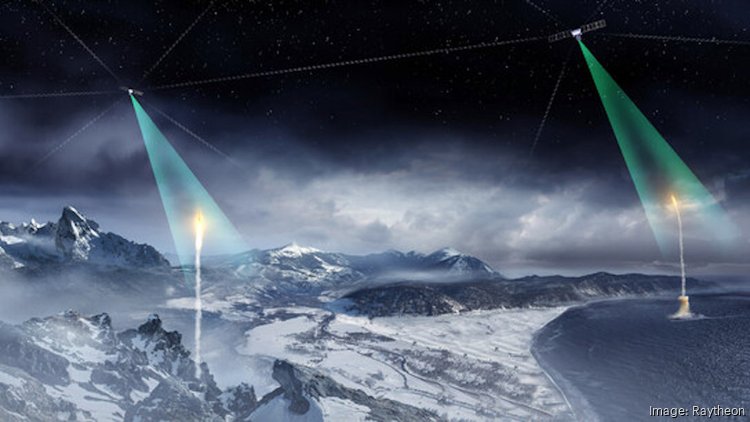Star wars: Raytheon wins contract to develop orbital hypersonic missile defense system

Raytheon Technologies has won a contract worth more than $250 million from the U.S. Department of Defense’s Space Development Agency to design and develop a satellite system to detect and track hypersonic missiles and other threats.
The contract was awarded to the company’s Space and Intelligence division, but the project aligns with key hypersonic missile development projects being done at the Tucson-based Missiles & Defense division. Raytheon (NYSE: RTX) said recently that the two divisions would be combined, but how that will affect Arizona operations is unknown so far.
Under the deal, Raytheon will deliver a seven-vehicle missile tracking satellite constellation and support launch and ground operations. The satellites will be in low-Earth orbit and will provide missile warning and tracking operations.
The project is part of the Defense Department’s Proliferated Warfighter Space Architecture, an initiative meant to help the military move faster to take advantage of the latest commercial technological developments.
“Developing a resilient and affordable proliferated satellite constellation in low-Earth orbit will improve our ability to track emerging threats like hypersonic missiles,” said Dave Broadbent, president of Space & C2 at Raytheon Intelligence & Space, in a statement. “Continuing to develop this architecture with SDA and our industry partners will be a high priority for us in the coming months.”
The contract comes several months after Raytheon Missiles & Defense and Northrop Grumman (NYSE: NOC) were awarded a contract worth nearly $1 billion to develop the first-of-its-kind Hypersonic Attack Cruise Missile (HACM) for the U.S. Air Force.
Raytheon now on China’s ‘unreliable entities list’
The two major Arizona defense contractors have been working jointly on the project since 2019, integrating Northrop Grumman’s scramjet engines into Raytheon’s air-breathing hypersonic weapons.
Separately, Raytheon said in a regulatory filing that its Missiles & Defense division had been placed on the Chinese government’s “unreliable entities list” in connection with foreign military sales to Taiwan. The listing means sanctions from China against the Raytheon Missiles & Defense, including “a fine equal to twice the value of the arms that RMD has sold to Taiwan since September 2020.”
Raytheon’s most recent year-end report also indicated that China decided to sanction the company’s Chairman and Chief Executive Officer Gregory Hayes in connection with sales activity with Taiwan.
In the past couple of weeks Raytheon and Northrop Grumman received a number of contract modifications from the Defense Department. They include the following:
- Raytheon was awarded a $219,867,079 modification to a contract for the production of 155 mm Excalibur Increment Ib projectiles. The funds are coming from the U.S. Army.
- Raytheon and Lockheed Martin were awarded an $18,946,203 contract modification for contractor support services for the Javelin Weapon System. Work will be performed in Tucson, with an estimated completion date of Feb. 28, 2024. Funds are coming from the U.S. Army.
- Raytheon and Lockheed Martin were also awarded a separate $13,541,544 contract modification for engineering services for the Javelin Missile System. Work will be performed in Tucson, with an estimated completion date of Jan. 31, 2024. Funds are coming from the U.S. Army.
Separately, Northrop Grumman in Chandler was awarded a $48,192,076 firm-fixed-price modification to a previously awarded agreement to continue to develop and refine its Glide Phase Interceptor concept during the Materiel Solutions Analysis Phase. The modification extends work through July of this year. Funds are coming from the Missile Defense Agency. The Glide Phase Interceptor project is also a joint effort between Raytheon and Northrop Grumman. The two companies won enhanced contracts for that work in the summer of 2022.
